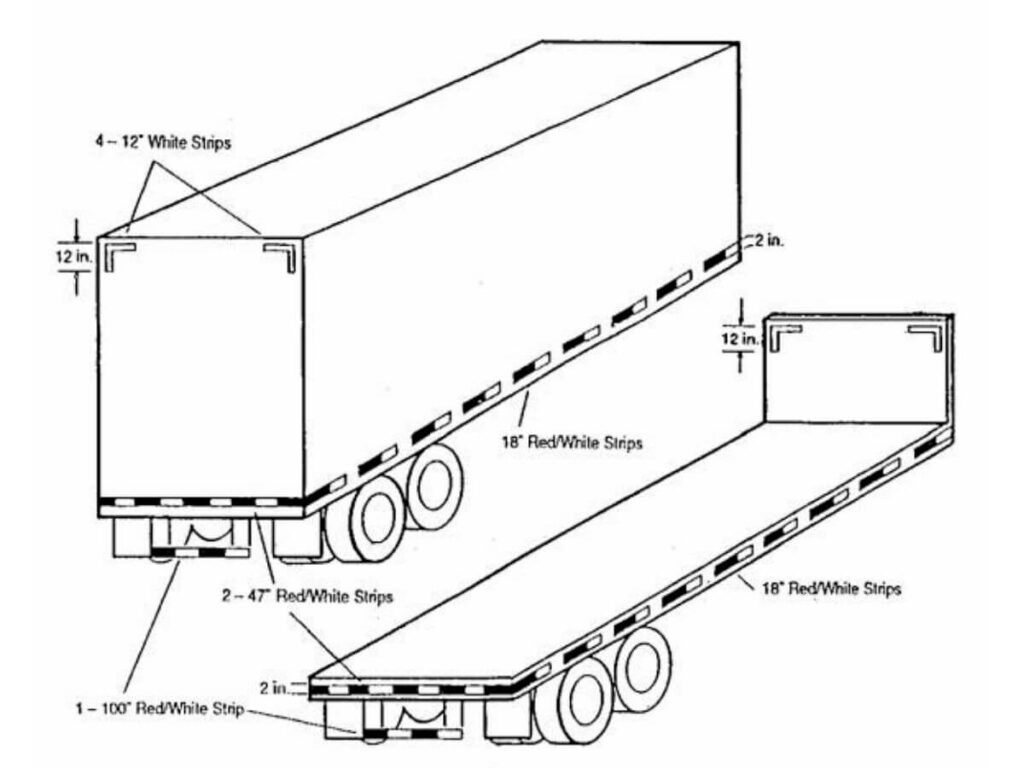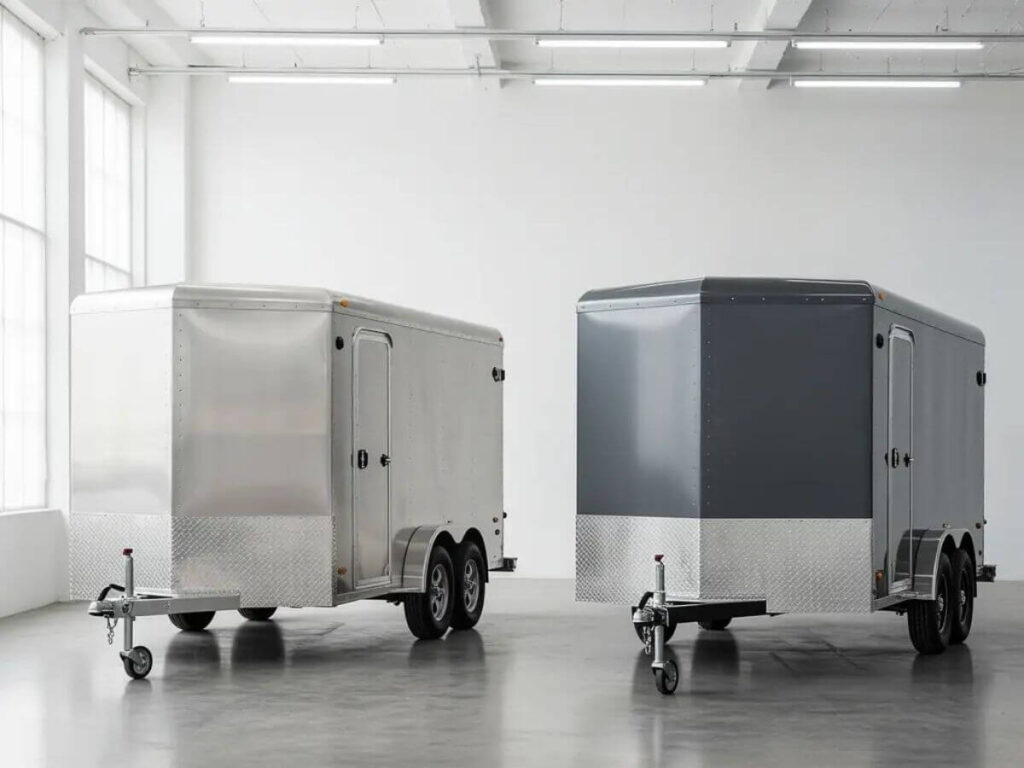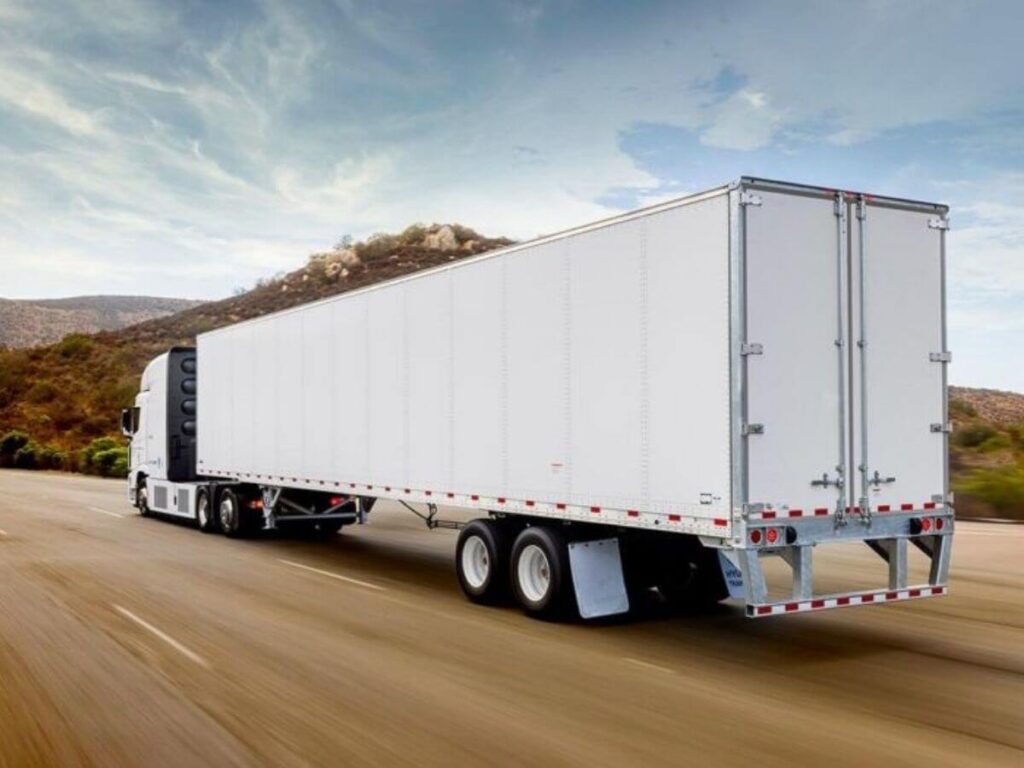I still remember standing in a trailer yard during my first job in logistics. A driver asked me, “Is this aluminum or steel?”
I froze. I had no idea. I just stared at the trailer’s side wall like it would answer for me.
That moment stuck with me.
Since then, I’ve spent over a decade working with trailers. From spec sheets to factory floors, I’ve learned what goes into building them—and why material choice matters.
If you’re asking “What are semi trailers made of?”, this article is for you. Whether you’re in construction, mining, logistics, or farming, this affects your business.
Here’s what we’ll cover:
- What metals and materials are used to build a trailer
- How each part (frame, flooring, side panels, axles) is constructed
- What to consider when choosing a trailer material
By the end, you’ll know what semi trailers are made of—and how that knowledge helps you make better decisions.
So let’s start!
1. Key Components of a Semi Trailer
When I first started walking through trailer yards, everything looked the same to me. Big box. Big wheels. But once I got into the business, I saw how each part plays a specific role.
Let’s break it down simply.
Every semi trailer is made of key parts. They all work together to carry heavy loads, protect cargo, and stay safe on the road.
Here are the main components:
- Chassis: This is the trailer’s backbone. It’s the steel frame that holds everything up. If the chassis is weak, everything else falls apart.
- Flooring and Walls: The floor handles constant pressure from forklifts, pallets, or machinery. The walls are protected from shifting cargo and outside damage. Some trailers use aluminum floors; others use hardwood or steel.
- Roof and Doors: The roof keeps out rain, snow, and sun. The doors—usually at the back—lock things in. Some doors are roll-up, others swing open. I’ve seen damaged doors ruin an entire load.
- Axles and Suspension: These parts carry weight and help the trailer move smoothly. The number of axles depends on the trailer’s size and use.
Understanding the structure helps you choose better. It also helps you catch problems before they grow.

2. Common Materials Used in Semi Trailer Construction
Not all trailers are built the same. And what they’re made of can change everything—from how much weight they carry to how long they last.
I’ve worked on trailers that held up for years—and others that wore out fast. Most of the time, the difference came down to material choice.
Let’s look at the most common ones used in trailer construction:
Steel
Steel is commonly used in the frame and chassis. It’s strong and reliable under heavy loads, which is why it’s still a top choice for demanding work.
Pros
- Highly Durable: Steel handles high-stress loads and rough conditions without bending or cracking. It’s built for heavy-duty jobs.
- Easy to Repair: Welding and patching steel is simple and widely available, which helps reduce downtime during repairs.
- Cost-Effective Upfront: It’s one of the most affordable materials for trailer manufacturing.
Cons
- Heavy Weight: Steel adds more to the trailer’s total weight, which increases fuel use and limits payload capacity.
- Prone to Rust: Without proper coatings, steel corrodes in wet, snowy, or coastal conditions, leading to costly repairs.
Aluminum
Aluminum is a lighter alternative to steel. It’s often used in walls, roofs, and even full trailer bodies when weight reduction is a priority.
Pros
- Rust-Resistant: Aluminum doesn’t rust, making it great for use in rainy or humid climates.
- Lightweight: Its lower weight improves fuel efficiency and allows for higher cargo capacity.
- Long Lifespan: With regular cleaning, aluminum holds up well over time and needs less maintenance than steel.
Cons
- Higher Material Cost: Aluminum is more expensive upfront, which affects the total cost of the trailer.
- Easier to Dent: It’s softer than steel and may dent or bend more easily under impact.
- More Complex Repairs: Aluminum welding requires special tools and skill, which can make fixes slower and more expensive.
Composite Materials
Composites include materials like fiberglass-reinforced plastic and carbon fiber panels. These are used more often in modern or specialty trailers.
Pros
- Corrosion-Resistant: Composites don’t rust or rot, making them ideal for wet or chemical-heavy environments.
- Lightweight but Strong: They offer a good strength-to-weight ratio, helping reduce fuel use without sacrificing durability.
- Low Maintenance: Composite panels generally last long with minimal upkeep.
Cons
- Expensive: These materials come at a higher cost than steel or aluminum.
- Harder to Repair: Repairs often require factory parts or trained technicians, which can be slower and costlier.
- Not Universally Available: Composite components may not be as easy to source or replace.
Wood (Used in Flooring)
Wood is still a common flooring choice in flatbeds and dry vans. It’s easy to work with and budget-friendly.
Pros
- Affordable: Wood costs less than other materials, making it good for fleets or budget-conscious buyers.
- Easy to Replace: Damaged boards can be swapped out quickly, reducing downtime.
- Provides Grip: Wood flooring offers natural friction, which helps prevent loads from shifting.
Cons
- Absorbs Moisture: Wood can rot, swell, or crack when exposed to water over time.
- Wears Out Faster: Heavy equipment, forklifts, or constant use can shorten its lifespan.
- Regular Maintenance Needed: Keeping wood in good condition requires drying, cleaning, and inspections.
Next time you spec a trailer, ask more than just “how much?” Ask what it’s made of—and whether it fits the job you need it to do. The right material can save you time, money, and headaches down the road.
At Rhinotrail, we are committed to delivering high-quality semi-trailers that meet diverse needs across various industries. We offer customized semi-trailer products and we are able to create tailor-made solutions that meet the specific standards and requirements of different countries and regions.
3. Factors Influencing Material Choice
I’ve made material choices that saved money—and others that caused headaches down the road. There’s no perfect material. It all depends on how you use your trailer.
Here’s what really affects your choice:
Load Type and Weight Capacity
The heavier the load, the stronger the material you need. Simple as that.
If you’re moving construction gear, mining equipment, or bulk cargo, you want steel. It holds up under pressure and doesn’t flex easily. I’ve seen aluminum trailers sag under loads they were never built for. It’s not worth the risk.
Industry Regulations
Different industries have different rules. If you’re hauling food, chemicals, or hazardous materials, there are material standards you must follow.
Some clients won’t even accept delivery if your trailer doesn’t meet code. I’ve had to redo orders because the material didn’t pass inspection. That’s time and money gone.
Weather and Environmental Conditions
Where you haul matters.
In salty coastal areas or places with heavy rain, rust is a big problem.Steel trailers rot from underneath because they weren’t treated properly. Aluminum or composite trailers do better in those climates.
If you park outside, it’s something you have to think about.
Budget and Long-Term Costs
Steel is cheaper up front. That’s why a lot of folks pick it first. But it’s heavier and may need more maintenance over time—especially if it rusts.
Aluminum costs more at first, but it can save you fuel and hold up longer. I’ve seen both sides. Sometimes spending more now saves you a lot later.
Fuel Efficiency Goals
Weight makes a big difference on fuel bills.
One customer switched from steel to aluminum for long-distance hauls and saved thousands on fuel in a year. Lighter trailers mean your engine doesn’t work as hard.
If you’re on the road a lot, the weight of your trailer can really add up.

4. Material Innovations in Semi Trailer Manufacturing
I remember walking through a trailer plant and spotting a panel that didn’t look like metal. It was a composite—light in my hand but felt strong. That was my first real look at how trailer materials are evolving.
Manufacturers are now building trailers that last longer, weigh less, and are even better for the planet.
Here are three innovations that stand out:
Advanced Composites
Composites are materials made by combining fibers like fiberglass or carbon fiber with resin. They’re lightweight but still strong enough to handle tough jobs. They are used in trailer walls and roofs where rust or dents used to be a problem.
Hybrid Construction
Some trailers now mix steel and aluminum in the same build. Steel is used where strength matters—like the frame. Aluminum gets used for the walls or roof to keep weight down and improve fuel savings.
Eco-Friendly Materials
More companies are thinking green. Some now use recycled metals or even bio-based plastics in non-structural parts. I’ve had customers ask for options that help reduce their carbon footprint.

5. Maintenance and Longevity Based on Materials
Material choice doesn’t just affect how a trailer performs—it also affects how long it lasts and how often it needs attention.
Each material comes with different maintenance needs. Some require regular care to stay in good shape. Others are more resistant but still need occasional checks.
Here’s a closer look at how each material type performs over time:
| Material | Maintenance Tips | Expected Lifespan | Notes |
| Steel | – Wash off road salt and dirt regularly. – Apply anti-rust coatings as needed. – Check weld points and joints for rust. | 15 to 20 years (with proper care) | Strong but prone to rust, especially in wet or coastal regions. Maintenance is essential. |
| Aluminum | – Use mild cleaners; avoid strong chemicals. – Inspect for dents or cracks. – Lubricate steel components. | Often equals or exceeds steel lifespan | Rust-resistant and lightweight. Needs surface protection to prevent wear and tear. |
| Composite Materials | – Clean regularly to prevent buildup. – Inspect for cracks at stress points. – Keep mounting hardware tight. | 20+ years (with minimal upkeep) | Very low maintenance. Great resistance to moisture and corrosion. |
| Wood (Flooring) | – Keep dry as much as possible. – Clear debris after each use. – Replace damaged boards quickly. | 8 to 10 years (shorter if neglected) | Affordable and easy to replace. Vulnerable to moisture damage and heavy impact over time. |
6. Tips To Consider When Selecting Semi Trailer Materials
Material selection can impact everything from durability to operating cost. It’s not just about picking what’s available—it’s about choosing what works best for your cargo, your routes, and your budget.
Tip #1 Know The Type of Cargo
A few years back, a customer asked me to spec a trailer for hauling heavy concrete pipes. They wanted to save money with aluminum, but I knew it wouldn’t hold up over time. Steel was the right fit.
The type of cargo you carry makes a big difference. If your loads are dense, heavy, or unevenly distributed, steel is usually the safer choice. On the other hand, if you’re moving packaged goods, food, or lightweight freight, going with aluminum or composite materials can give you better fuel savings.
Tip #2 Operating Conditions
Where you use the trailer matters. Trailers exposed to rain, snow, or coastal air are more likely to corrode over time. In those cases, rust-resistant materials like aluminum or composites are better suited for the job.
Tip #3 Regulatory Standards
Some industries follow strict rules about trailer materials. For example, food and chemical transport often requires non-reactive or certified surfaces. Choosing the right material helps you stay compliant and avoid penalties. I suggest purchasing from reputable suppliers of trailers like Rhinotrail, who understand these regulations and offer industry-compliant solutions built for safety, reliability, and legal peace of mind.
Tip #4 Budget Constraints
Everyone wants to save money up front. I get that. But I’ve also seen companies spend more on repairs and fuel over time because they went with the cheapest option.
Steel trailers are more affordable to buy, but they’re heavier. That weight can add up in fuel costs. Aluminum and composites cost more early on but often save money in the long run through lower maintenance and better fuel efficiency.

Conclusion
I didn’t have the answers back in that trailer yard. But now you do.
You’ve learned what semi trailers are made of, how different materials hold up, and what to think about before making your next move.
So are you looking for fast delivery through an efficient production and distribution system? Then, Rhinotrail is the right partner for your next trailer build.
Contact us today. Let’s talk materials, goals, and results!


